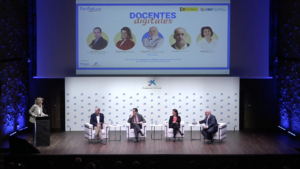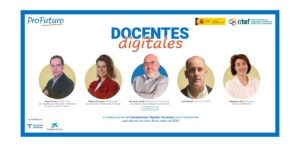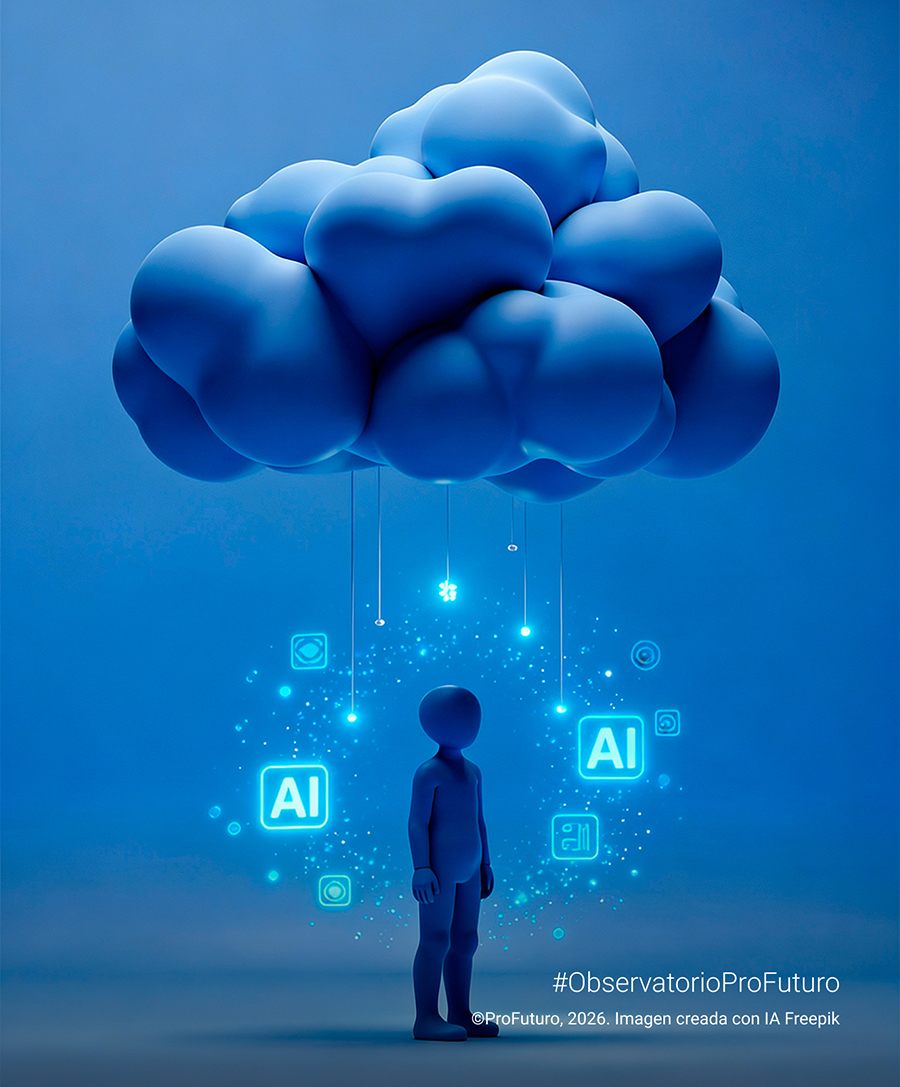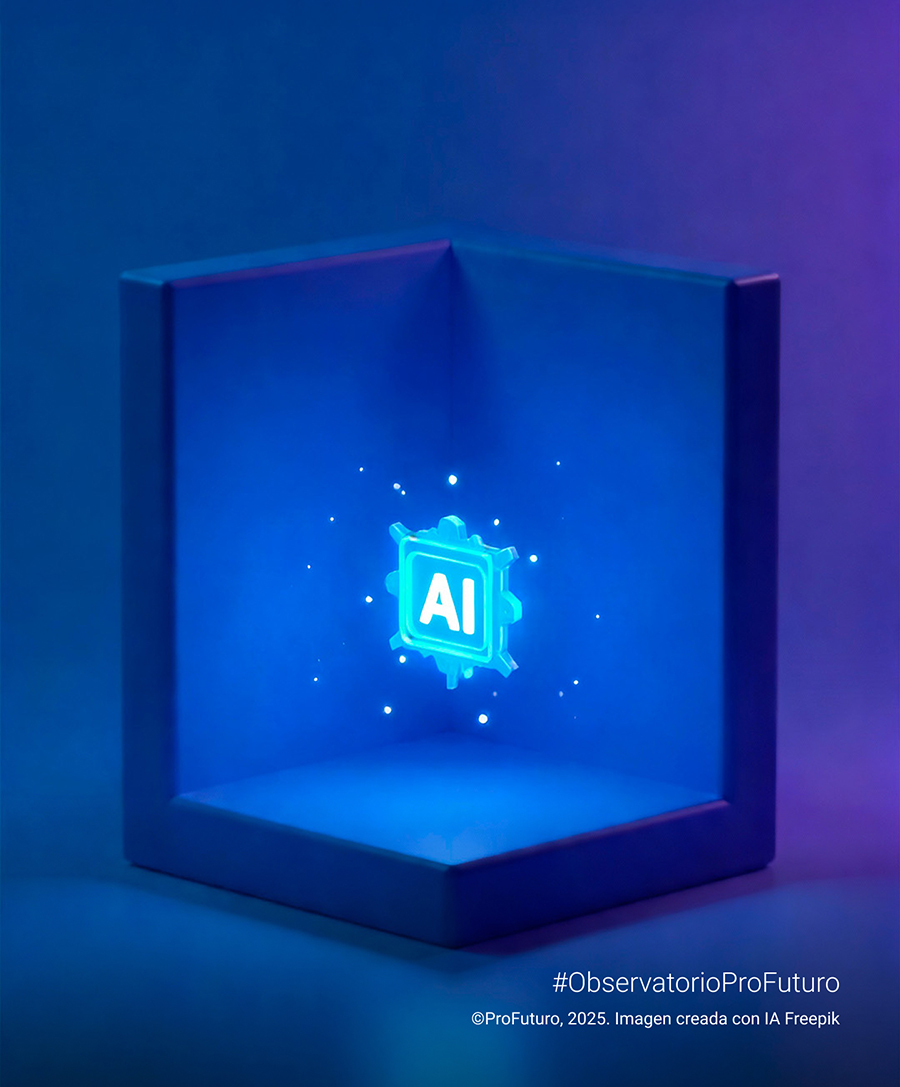What does a digitally competent teacher need to know? What skills and competences do they need to develop? How can we help them to do so? The assessment of teachers’ digital skills and how they integrate them into their pedagogical practices is a key issue in developing teachers who are able to offer their students a quality education that meets the challenges of the 21st century. To talk about its importance and the challenges it poses, the ProFuturo Foundation organised, together with the Teacher Training Institute (INTEF)the meeting “Digital teachers. The assessment of teachers’ digital skills as a tool to face the challenges of the classrooms of 2030″.
The meeting, which was held in Madrid, was attended by experts from the public and private sectors such as Alejandro Fernández de las Peñas, commercial manager of the Corporate Education and Marketing Area of the La Caixa Foundation; Julio Albalad, Director of INTEF; David Cervera, Deputy Director General of Innovation and Teacher Training Programmes of the Regional Ministry of Education, Universities, Sciences and Spokesperson of the Community of Madrid; Milada Gonçalves, Head of Innovation and Product at ProFuturo; Magdalena Brier, Director General of ProFuturo, and Fernando Trujillo, professor at the University of Granada and founding partner of Conecta 13.
The challenges of assessing teachers’ digital skill
What are the main challenges we face when we talk about the assessment of teachers’ digital skill? Fernando Trujillo listed some of them:
- It is still in its infancy: when looking at the development of assessment mechanisms, in terms of the ISO 16290 standard, we are still at technology maturity levels 1 or 2. In other words, for now, what we have are assessment and certification processes based on questionnaires and perception of competence. Therefore, carrying out a massive, serious and committed evaluation is the first challenge we must face.
- Constantly evolving: Competences develop with life and the assessment of digital skill is no different from the assessment process for any other competence. We will therefore need evaluation mechanisms that capture these complex assessments.
- Obsolescence: the pace at which technology is evolving means that digital skills linked to technological literacy are rapidly becoming obsolete.
- Privacy and data security: If we are going to assess teachers’ digital skill, we will be dealing with sensitive teacher data that needs to be handled with great care.
- Gender perspective: the gender perspective must always be present in any factor of social or educational analysis that we want to consider. How do we do an evaluation in which there is not only a peer evaluation of teachers, but in which we also ensure that the results obtained provide a fair evaluation from a gender perspective?
- Processes aimed at improving learning: Moreover, this whole process has to be seen in time. We cannot speak of one-off evaluations but of evaluation processes. We need to talk about certification processes and the impact that assessment can have on learning outcomes, otherwise what is the point of this pilgrimage? In other words, if we cannot get the assessment of teachers’ digital skill to generate more sophisticated and more complex learning outcomes… what is the point of going to such lengths?
- The beginning of a path: as we have seen, evaluation is a necessity for improvement that must have specific characteristics: in principle it must be valid and reliable, but it must also be fair, respectful, safe, formative, serve for improvement… in other words, evaluation is only the threshold, the beginning of a path.
What lies behind this threshold and how to start taking the first steps on this path were discussed by the other experts gathered at the colloquium.
Digital skill: pupils, schools and teachers
 J
J
Julio Albalad, director of INTEF, set out a clear direction: the improvement of students’ digital skill, for which teacher training and the assessment of their digital skills is a fundamental tool. In this conception, all the actions that we carry out on this issue must be absolutely linked to the school: if we want to improve the competence of pupils and we want to improve the competence of teachers, let us improve the schools where they work.
This requires the creation of digitally competent schools. How? Through the Centre Digital Plan, which consists of a kind of initial snapshot that shows us what relationship the centre has with new technologies, with the digital skill of the teachers, of the students, what digital infrastructure the centre has… And, once we have this initial snapshot, we establish the goals and objectives to be achieved and the ways to achieve them.
Cascade training: be the change
For David Cervera, it is very important to know which digital skills of teachers should be assessed, which are many and, of course, should not only focus on the strictly “technological”. Because “measuring digital skill in teaching is not strictly about how tech-savvy or computer literate a teacher is”. What we need to assess is how they integrate technology into their pedagogical practice to foster learner autonomy in using these technologies to solve certain problems. And this is the real shift that our education systems need to make.
How do we do this? Using so-called cascade training, through peer mentoring and groups of teachers, and information sharing in all directions. Because, often, the best professional update comes from those who already have the experience, those who have gone through similar problems in the classroom and have overcome them. “We propose to them (in the Community of Madrid and in other communities) to share experiences in order to reinvent them and share them again”. In addition, the transformation of schools is enhanced through the training of “leaders” for teacher training in schools and institutes
The value of an idea that arrives on time
The profusion of digital skill assessment tools for teachers, especially since the COVID-19 pandemic, indicates that we have passed the initial moments of doubt as to whether digital skills were going to take hold and prove useful in education. Today, according to Mila Gonçalves, that has become clear. “The question now is how do we do this to help the teacher develop these competences”. The first thing is to get to know the teacher, Mila adds. It should be noted that ProFuturo works in vulnerable environments in 40 very different countries, each with its own complexities. And this is where self-assessment tools, such as the one being developed by this foundation in collaboration with CIEB, play a fundamental role.
In this context, this self-assessment tool aims to promote teachers’ reflection on their own knowledge and use of digital technologies in their daily practice, while stimulating teachers’ autonomy in their professional development.
How to involve teachers in these evaluation processes?
One of the biggest challenges in the assessment of teaching competence (digital or otherwise) is to make teachers themselves motivated to approach this assessment. Because who likes to be evaluated? In this case, for David Cervera, the key lies in the teacher’s own professional commitment because “the most important thing is that it is achieved through self-conviction”.
For Mila Gonçalves, it is important to develop “a culture of evaluation and monitoring”, which has to extend throughout the organisation down to the teacher. It is also essential that the teacher “feels confident and sees value in that assessment. He has to see that it will be useful and that it will bring him something.
An epochal change
The emergence of ICT in education can only be compared to the invention of the printing press. In the words of Alejandro de las Peñas: “We are not in an era of change, but in a change of era. Digital education is about thinking. A different way of thinking. We are at the beginning of a long and exciting journey. In social terms, we are facing a transformation that, like the printing press in its day, could represent an immense qualitative leap in the democratisation of access to quality education. However, as Magdalena Brier states, “the introduction of technology is not enough if it does not go hand in hand with social innovation and pedagogical innovation. And for that, teachers are fundamental. Collaborating in their digital competence development, with an assessment for metacognition, for the real improvement of their pedagogical and didactic expertise is fundamental for them to become leaders of a change “that we must all make together”.
If you want to know more about the evaluation of teachers’ digital skills, we recommend you to watch the full video of the debate.







